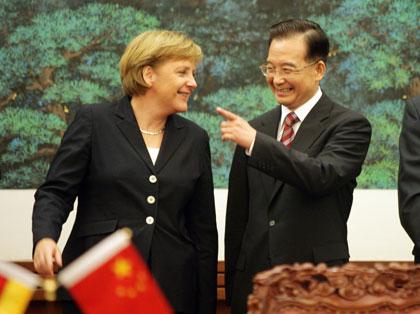China and Germany signed a batch of 19 agreements on the first day of German Chancellor Angela Merkels China visit, including a memorandum of understanding to cooperate in establishing high-speed railway transport in China.

Chinese Premier Wen Jiabao (R) gestures as he talks with German Chancellor Angela Merkel at the signing ceremony of China-Germany agreements in Beijing May 22, 2006. [newsphoto]
Under this agreement, Germany will cooperate in building Chinas high-speed rail system, at 200 kilometers per hour, according to a Xinhua report.
Merkel, and her host, Chinese Premier Wen Jiabao, were present at the signing ceremony of the agreements at the Great Hall of the People in Beijing.
Magnetic-levitation technology is a new field for China-Germany cooperation, but there was no indication of whether Beijing planned to buy more German technology for magnetic-levitation railways.
China has the worlds only commercially operating maglev rail line in Shanghai, linking Pudong International Airport with downtown Shanghai, built by a German consortium that included Thyssenkrupp AG and Siemens AG.
China announced in March that it would add a 175-kilometer (110-mile) maglev line to the nearby city of Hangzhou at a cost of 35 billion yuan (US$4.3 billion, but hasnt said what role foreign contractors might play.
These documents mainly cover such fields as railway technology, financial cooperation, high tech dialogue, telecommunications, energy, culture and sports. The two sides also signed a memorandum of understanding on the protection of intellectual property in textile industry.
Merkel, who arrived in Beijing Sunday night for a two-day official visit, will also travel to Shanghai.
During her stay in Shanghai, the last leg of her China tour, Merkel will make a train trip along the maglev line to the terminal, the Pudong International Airport. The Shanghai maglev train project is the important fruit of China-Germany cooperation in technological cooperation.
Merkels delegation, which comprises senior officials including Economy Minister Michael Glos, Transport Minister Wolfgang Tiefensee and a delegation of 40 executives from companies such as Siemens and Lufthansa, indicates the economic importance of her trip.





